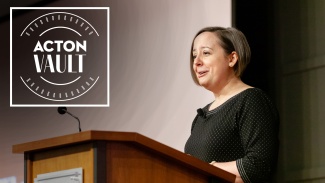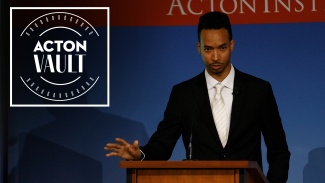
Overview
In this episode, we’re bringing you the most recent presentation from our Acton Lecture Series program, featuring the recipient of the Acton Institute’s 2020 Novak Award, Dr. Gregory Collins.
Named after distinguished American theologian Michael Novak, this honor rewards new, outstanding scholarly research concerning the relationship between religion, economic freedom, and a free and virtuous society. It recognizes those scholars early in their academic career who demonstrate outstanding intellectual merit in advancing the understanding of theology’s connection to human dignity, the importance of the rule of law, limited government, religious liberty, and freedom in economic life.
Gregory M. Collins is a Postdoctoral Associate and Lecturer in the Program on Ethics, Politics, and Economics at Yale University. His book on Edmund Burke’s economic thought, Commerce and Manners in Edmund Burke’s Political Economy, was published by Cambridge University Press in 2020 and has already garnered significant attention inside and outside the academic community. He has published, or has forthcoming, articles on Burke, Adam Smith, Leo Strauss, Britain’s East India Company, and Frederick Douglass in the Review of Politics, History of Political Thought, American Political Thought, Journal of the History of Economic Thought, Slavery & Abolition, and Perspectives on Political Science. His current book project is a comparative study of Burke and the Enlightenment.
In this lecture, drawing out some important themes of his recently published book on Edmund Burke’s economic thought, Commerce and Manners in Edmund Burke’s Political Economy, Dr. Collins explains whether Burke overcame perhaps the most powerful moral and metaphysical objection to commercial exchange: that the never-ending process of economic satisfaction is fundamentally at odds with the good life.
Acton Institute names Gregory M. Collins of Yale University the 2020 Novak Award winner















